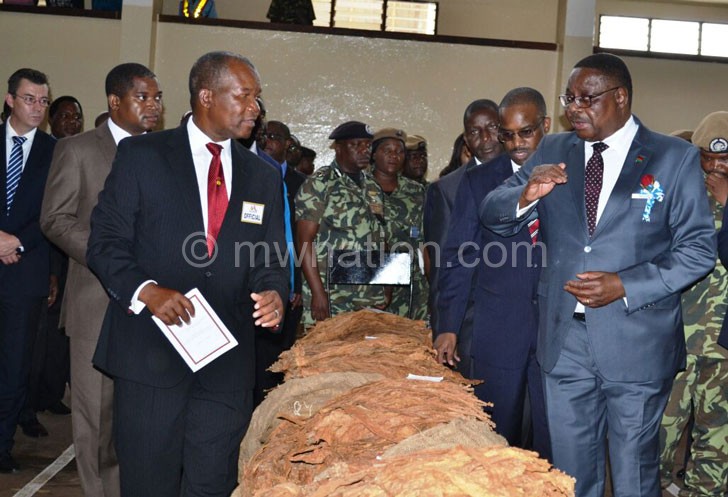Poor start to tobacco sales
President Peter Mutharika on Wednesday opened the 2016 Tobacco Marketing Season in Lilongwe where 30 percent of bales offered under the auction system were rejected and farmers and growers differed on prices.
Random checks by The Nation showed that burley tobacco, grown mostly by smallholder farmers, fetched the lowest price of $0.80 (about K552) per kilogramme (kg) and the highest price of $1.80 (about K1 242) per kg. This is in sharp contrast to last year when the first bale on auction system was bought at $2.32 (about K1 044 at K450/dollar) per kg.

By the time the President left the Lilongwe Floors at Kanengo, about 30 out of every 100 bales offered for sale under the auction system had been rejected. On the other hand, nearly all tobacco sold under the contract system—where farmers get inputs from tobacco companies—was bought.
Tobacco Association of Malawi (Tama) president Reuben Maigwa expressed surprise that buyers bought “low quality tobacco” under auction system at the expense of the leaf that looked more appealing to the eye.
He said: “Even the low quality tobacco is being bought at minimum prices and not higher than minimum.”
Maigwa said compared to last year, the situation this year is bad because low quality tobacco is fetching $0.80 per kg while last season it was being bought at $0.85 (K586) per kg.
Farmers Union of Malawi (FUM) president Alfred Kapichira-Banda said with the kwacha appreciation, he never expected the prices to be poor.
“It is sad because the kwacha is gaining strength to the dollar only at a time farmers are selling tobacco when they bought inputs at very high prices. I just hope that things will change as the season goes on but today I have not been inspired,” he said.
But Banda observed that the low quality of the leaf offered could be attributed to the fact that some of the tobacco was wet. He also noted that the rejection affected the auction system more because farmers lacked supervision from buyers unlike their counterparts on contract system.
Some buyers The Nation spoke to shared Kapichira-Banda’s observations on the condition of the leaf on the opening day.
In an interview, Limbe Leaf Tobacco Company Limited managing director Rodney Hagger said some of the leaf on offer was over conditioned (too wet).
He said: “Even though the standard of tobacco is reasonable, some of the tobacco being sold both under contract and auction is high conditioned and my advice to growers is that they should prepare well for the market. Some farmers sprinkle their tobacco with water and this affects quality.”
Hagger said no tobacco grade was bought below its minimum price. He pledged that Limbe Leaf will buy as much tobacco as they can this year.
JTI Malawi Limited director of corporate affairs and communication Antonio Vencesla said the quality of tobacco on the first day was good although farmers normally test the market during the early days.
“It takes a while for the market to settle, but there is a good range. As JTI, we prefer tobacco grown under contract because contract is the best,” he said.
Associated Central Africa Limited, another buyer, also shared the concern of wet tobacco.
The company’s managing director Allan Johnstone said prices yesterday morning were highly affected by the over conditioning of the leaf.
In his address, the associations, buyers and other players against exploiting growers.President warned tobacco
Mutharika also urged buyers to offer fair prices and warned against segregating Malawians in the tobacco sector.
Tobacco Control Commission (TCC) board chairperson Inkosi Ya Makhosi M’mbelwa V said most of the challenges facing growers, including poor prices and exploitation, boil down to lack of a Tobacco Industry Act.
He said delays in revising the Act, coupled with a plethora of other local and international challenges negatively affect the leaf’s production and marketing in the country.
Said M’mbelwa: “On the global market, the major challenge is the anti-smoking lobby, which has had negative effects on our farmers resulting from reduced demand for Malawi tobacco, loss of livelihoods for tobacco farmers and reduced employment from tobacco related jobs.”
This year’s marketing season comes amid a 33 percent overproduction against a demand of 158.1 million kg, according to first round crop estimates which were released in February. The estimates had put production at 211 million kg.
Last year, Malawi produced 192 million kg of tobacco which earned the country $337.4 million (about K216.8 billion).
Tobacco is Malawi’s main export crop, contributing about 60 percent of foreign exchange earnings and 13 percent of the gross domestic product (GDP).





